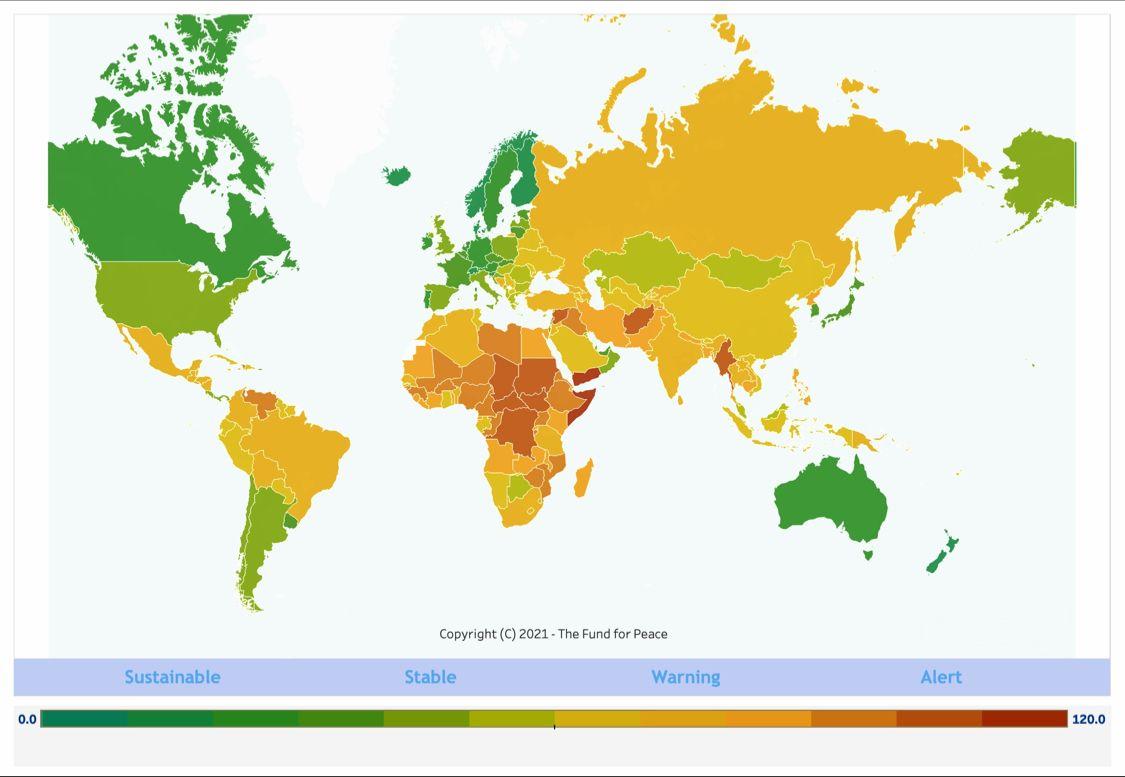Highlights from the 18th Annual Fragile States Index Launch

14 June 2023 – Center for Civil Liberties Executive Director Oleksandra Romantsova participated in the Fund for Peace conducted an open discussion dedicated ещ Launch of the 2023 Fragile States Index 2023 with the presentation: “Assessing Fragility at Home and Abroad: Understanding Risks and Building Resilience”
Center for Civil Liberties Executive Director Oleksandra Romantsova participated in the Launch of the 2023 Fragile States Index 2023 with the presentation: “Assessing Fragility at Home and Abroad: Understanding Risks and Building Resilience”
The 2023 Fragile States Index is the 18th annual iteration of a data-driven policy tool that stands as a leading measure of political, social, and economic pressures across 179 countries
In 2022, the aftermath of COVID-19 and the war in Europe brought the highest rates of global inflation since the 1990s, especially in Central Asia, the Caucasus, and the Middle East; as well as violent fuel protests in Africa, Latin America, and the Caribbean; and food insecurity across the developing world. Violent extremism and military coups continued to surge in West Africa. Political crises spiked in countries like Sri Lanka and Peru.
Many in the foreign policy establishment have turned their attention from fragility to the threats emanating from competition between great powers in the East and West. But fragility still matters, including overlooked elements of fragility within the great powers themselves.
During the discussion we contemplate the ways in which fragility is crucial for understanding risks both at home and abroad, and why resilience is necessary for weathering these challenges and working for a brighter future.
Opening Remarks were provided by Ambassador Todd Robinson, Assistant Secretary of State for International Narcotics and Law Enforcement Affairs.
The panel is moderated by Paul Turner, Executive Director and President of Fund For Peace, and consists of the following experts:
- Dr. Adriano Nuvunga, Director at the Center for Democracy and Development and Chairperson of the Mozambique Human Rights Defenders Network, Mozambique
- Oleksandra Romantsova, Executive Director, Center for Civil Liberties, Nobel Peace Prize Laureate 2022, Ukraine
- Esther Daramola, Senior Analyst, Government and Human Rights, Directorate of Early Warning, ECOWAS, Nigeria/West Africa
- Jeffsky Poincy, Program Manager, PartnersGlobal, Haiti.
Oleksandra Romantsova emphasizes that: Ukraine is important for the global economy and what happened inside of Ukraine, Russian illegal aggression may lead to malnutrition and hunger, the spread of diseases in other nations in Africa and Asia. We should remember how important is Ukrainian grain in a globalized (aka) fragile world economy that suffers from climate change, migration and conflicts.
For Ukraine, the war started in 2014, and the Russian invasion of 2022 the rise of private armies such as the Wagner group, and Russian involvement in Syria and Central Africa are the consequences of the lack of accountability.
Wagner group is responsible for IHL violations and war crimes in Central Africa and Mali. We see that world’s indifference to these actions brings Wagner to our soil.
International society was not prepared to react. They still bought oil and gas from Russia even after the occupation of Crimea. The money that they get from the fossil fuel trade will not be spent on healthcare, education, medicine o public transportation, not for improving the quality of life of Russian citizens but for weapons of destruction.
Instead of solving global problems, we are part of the fighting. Our IT specialist, our home front and the brightest minds are involved in repelling Russian aggression.
If we as a global community do not react to the Russian invasion and war crimes today, such acts will become a new normality, new status quo, realpolitik. This new normality will ruin all other rules of society and the post-1945 global order that were created to protect democracy.
Background Note:
For over 60 years, The Fund for Peace (FFP) has been a world leader in developing practical tools and approaches for reducing conflict. With a clear focus on the nexus of human security and economic development, FFP contributes to more peaceful and prosperous societies by engineering smarter methodologies and smarter partnerships. FFP empowers policy-makers, practitioners, and populations with context-specific, data-driven applications to diagnose risks and vulnerabilities and to develop solutions through collective dialogue.
FFP is an independent 501(c)(3) non-profit organization headquartered in Washington, D.C. with offices in Abuja, Nigeria and Tunis, Tunisia.

